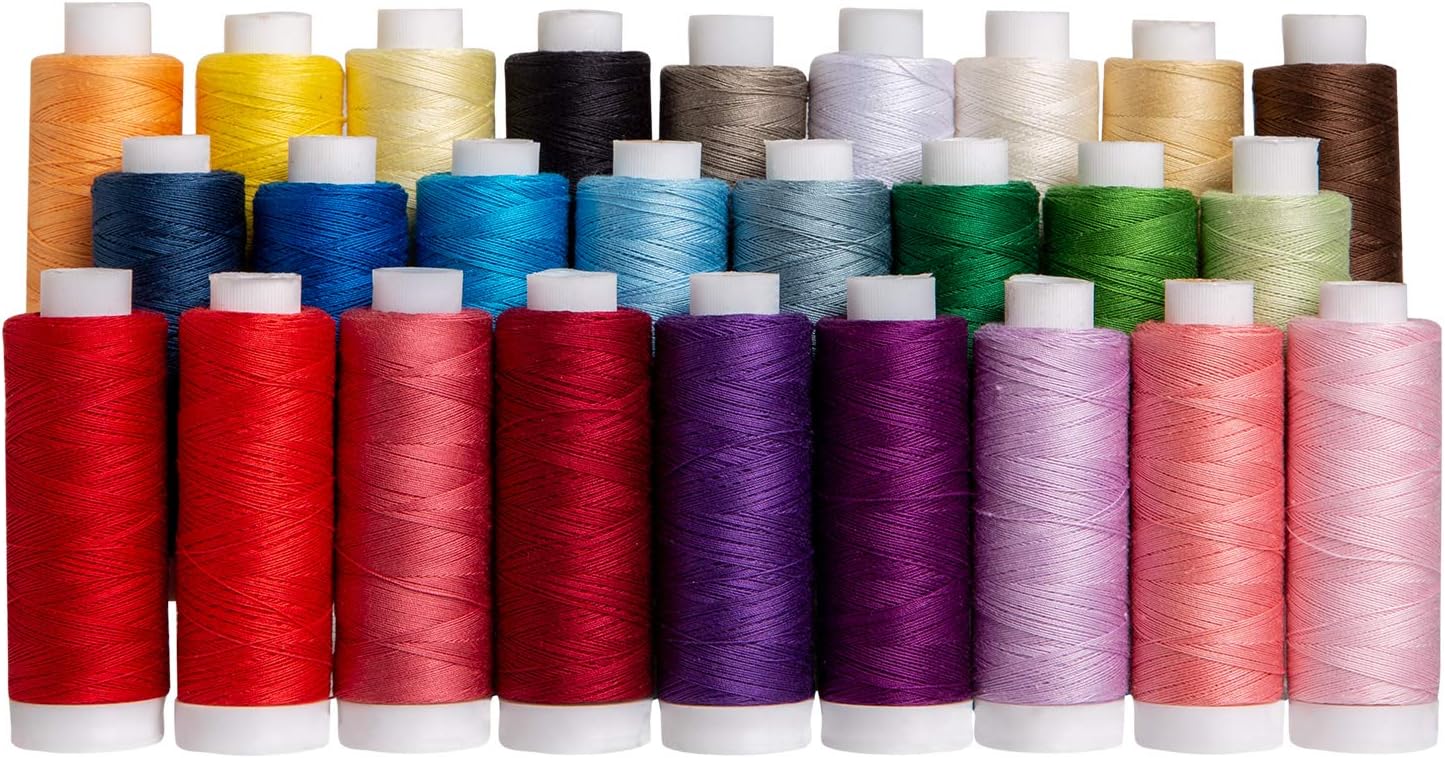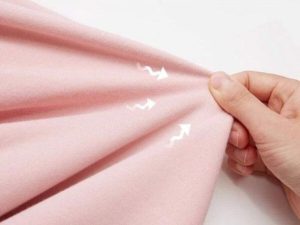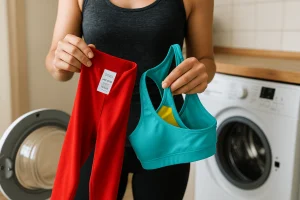Thread is the unsung hero of the textile industry, playing a crucial role in holding together the fabric of our clothing and accessories. This article delves into the world of industrial sewing threads, exploring their types, properties, and applications in the garment manufacturing sector.
II. Classification of Sewing Threads

Sewing threads come in various types, each with unique characteristics suited for different applications. Let’s explore the main classifications based on raw materials and structure.
1. Sewing Threads by Raw Materials
The choice of raw material significantly impacts the thread‘s performance and suitability for different fabrics and applications.
Cotton Threads
Cotton threads are a popular choice in the textile industry due to their natural properties and versatility.
- Characteristics:
- Made from 100% natural cotton fibers
- Smooth and glossy surface
- Excellent heat resistance when ironing
- Available in various colors and sizes
- Advantages:
- Easy to dye, allowing for a wide range of color options
- Soft texture, ideal for children’s clothing
- Affordable and widely available
- Easy to maintain at different temperatures and light conditions
- Quick-drying if accidentally wet before use
- Applications:
- Suitable for general sewing tasks
- Ideal for cotton and natural fiber fabrics
- Commonly used in children’s clothing and everyday wear
Cotton/Polyester Blend Threads
These threads combine the best properties of both cotton and polyester fibers.
- Characteristics:
- Consists of a polyester core wrapped with cotton fibers
- Low stretch capability
- Maintains the shape of cotton threads
- Durable and non-lustrous appearance
- Advantages:
- Stronger than pure cotton threads
- Better resistance to abrasion and wear
- Retains the natural feel of cotton
- Applications:
- Ideal for everyday clothing items
- Suitable for fabrics that require a balance of strength and comfort
Linen Threads
Linen threads are known for their strength and unique texture.
- Characteristics:
- Made from flax fibers
- Tightly twisted structure
- Can be blended with other fibers for enhanced properties
- Advantages:
- High tensile strength
- Excellent resistance to mold and mildew
- Natural, rustic appearance
- Applications:
- Traditional leather saddlery
- Handbags and accessories
- Decorative stitching in home furnishings
Metallic Threads
Metallic threads add a touch of glamour to garments and accessories.
- Characteristics:
- Consist of a metallic coating over a core thread
- Available in vibrant and shimmering colors
- Advantages:
- Create eye-catching, decorative effects
- Add luxury and sparkle to garments
- Applications:
- Embroidery and decorative stitching
- Evening wear and formal attire
- Theatrical costumes
Nylon Threads
Nylon threads are known for their strength and elasticity.
- Characteristics:
- Made from synthetic polymer fibers
- Can melt when exposed to high heat
- Transparent appearance
- Advantages:
- Extremely durable and strong
- Resistant to abrasion and chemicals
- More widely used than polyester in some applications
- Applications:
- Heavy-duty sewing tasks
- Outdoor gear and equipment
- Footwear manufacturing
2. Classification of Threads by Structure
The structure of sewing threads affects their performance and appearance in finished garments.
Core-Spun Threads
Core-spun threads are engineered for strength and comfort.
- Characteristics:
- Consist of a polyester core wrapped with cotton fibers
- Combine durability with a soft, natural feel
- Advantages:
- Ideal for 100% dyed garments
- Better sewing performance compared to staple fiber threads of the same size
- Reduced risk of thread unwinding during sewing
- Applications:
- High-quality garments requiring both strength and comfort
- Denim and heavy-duty fabrics
Filament Threads
Filament threads are categorized into monofilament and multifilament varieties.
# Monofilament Threads
- Characteristics:
- Consist of a single nylon filament
- Transparent appearance
- Extremely strong and durable
- Advantages:
- Nearly invisible in colored garments
- Reduces thread inventory needs
- High abrasion resistance
- Disadvantages:
- Can be difficult to handle due to stiffness
- May irritate skin if thread ends are exposed
- Applications:
- Hemming and seaming in low-cost garments
- Situations where thread visibility should be minimized
# Multifilament Threads
- Characteristics:
- Composed of multiple filament strands twisted together
- Can be bonded to form a cohesive thread
- Advantages:
- Extremely strong and durable
- Smooth surface for consistent stitching
- Applications:
- Upholstery and furniture manufacturing
- Footwear production
- High-stress seams in performance wear
Properties of Sewing Threads
The properties of sewing threads are crucial in determining their suitability for different applications and their impact on the final product quality.
Color
The color of the thread plays a significant role in the overall appearance of the garment.
- Importance:
- Affects the visual quality of the finished product
- Should complement or match the fabric color
- Considerations:
- Shade, luster, and gloss should be evaluated
- High-quality garments often use thread colors that closely match the fabric
- Slightly darker thread colors are often preferred for better blending
- Cost-saving tip:
- Basic colors like white and black can be used in non-visible areas
Thread Strength
The strength of the thread is vital for the durability of seams and overall garment longevity.
- Types of strength:
- Breaking strength
- Abrasion resistance
- Flex, compression, and twist resistance
- Factors affecting strength:
- Sewing machine speed
- Machine settings
- Thread quality
- Importance:
- Thread should be stronger than the fabric to prevent breakage during sewing, washing, and wear
- Excessive strength is not always beneficial and can lead to other issues
Color Fastness
Color fastness refers to the thread‘s ability to retain its color under various conditions.
- Testing conditions:
- Washing
- Exposure to light
- Sweat
- Chemicals
- Ironing
- Importance:
- Ensures the thread maintains its appearance throughout the garment’s lifecycle
- Prevents color bleeding or fading that could affect the overall look of the garment
Thread Evenness
The consistency of the thread‘s thickness and texture is crucial for smooth sewing operations.
- Characteristics of good thread evenness:
- Uniform thickness
- Smooth texture
- Free from defects, fuzz, or twists
- Importance:
- Ensures smooth passage through sewing machine parts
- Prevents thread breakage during sewing
- Contributes to consistent stitch quality
Thread Size
The appropriate thread size is determined by the fabric weight and the desired seam appearance.
- General rule:
- Heavier fabrics require thicker threads
- Lighter fabrics require finer threads
- Considerations:
- Thicker threads are generally stronger but may cause more wear on machine parts
- Thicker threads can potentially cause skipped stitches in dense fabrics
- Recommendation:
- Use the finest thread possible that still provides adequate strength for the application
Thread Twist
The direction and degree of twist in a thread affect its performance and appearance.
- Common twist direction:
- Z-twist is the most prevalent in sewing threads
- Importance of proper twist:
- Affects thread stability
- Influences stitch formation and appearance
- Issues with improper twist:
- Over-twisting can lead to kinking and looping
- Under-twisting can reduce thread strength
Thread Shrinkage
The amount of shrinkage a thread experiences can affect the final garment’s appearance and fit.
- Definition:
- The reduction in thread length due to washing or heating
- Measurement:
- Expressed as a percentage of the original thread length
- Importance:
- Thread shrinkage should be compatible with fabric shrinkage
- Excessive thread shrinkage can cause seam puckering
Thread Elasticity and Elongation
The ability of a thread to stretch and recover is crucial, especially for knit fabrics and stretch garments.
- Elasticity:
- The thread‘s ability to return to its original length after stretching
- Elongation:
- The amount a thread can stretch before breaking
- Importance:
- Critical for maintaining seam integrity in stretch fabrics
- Prevents loose stitches and seam gaping
- Consequences of poor elasticity:
- Can lead to loose stitches and poor seam coverage
- May cause seam puckering similar to shrinkage issues
III. Common Industrial Sewing Threads Used in the Garment Industry

The garment industry relies on a variety of sewing threads to create durable and attractive clothing. Here are some of the most commonly used types:
Cotton Threads
Cotton threads remain a popular choice for many applications due to their natural properties and versatility.
- Characteristics:
- Made from 100% natural cotton fibers
- Soft and comfortable against the skin
- Good heat resistance
- Applications:
- Everyday clothing
- Children’s wear
- Natural fiber garments
- Advantages:
- Breathable and hypoallergenic
- Easy to dye and color-fast
- Biodegradable
- Disadvantages:
- Less durable than synthetic threads
- May shrink or stretch more than synthetic options
Polyester Threads
Polyester threads are widely used in the garment industry due to their strength and versatility.
- Characteristics:
- Made from synthetic fibers
- High tensile strength
- Resistant to stretching and shrinking
- Applications:
- Durable outerwear
- Sportswear
- Uniforms and workwear
- Advantages:
- Excellent abrasion resistance
- Color-fast and resistant to fading
- Low moisture absorption
- Disadvantages:
- Less breathable than natural fibers
- Can generate static electricity
Rayon Threads
Rayon threads offer a combination of natural-like properties with some advantages of synthetic fibers.
- Characteristics:
- Made from regenerated cellulose fibers
- Soft and silky texture
- High luster appearance
- Applications:
- Decorative stitching
- Embroidery
- Lingerie and delicate garments
- Advantages:
- Drapes well and blends easily with other fibers
- Good moisture absorption
- Available in vibrant colors
- Disadvantages:
- Less durable than polyester
- Can weaken when wet
Silk Threads
Silk threads are prized for their luxury and unique properties in high-end garments.
- Characteristics:
- Made from natural silk fibers
- Extremely fine and strong for its weight
- Smooth and lustrous appearance
- Applications:
- Luxury garments
- Fine tailoring
- Couture and bridal wear
- Advantages:
- Exceptional strength and elasticity
- Beautiful, natural sheen
- Comfortable and hypoallergenic
- Disadvantages:
- Expensive compared to other thread types
- Requires special care in washing and maintenance
Comparison Table of Common Industrial Sewing Threads
| Thread Type | Strength | Elasticity | Heat Resistance | Cost | Best For |
|---|---|---|---|---|---|
| Cotton | Moderate | Low | High | Low | Natural fiber garments, everyday wear |
| Polyester | High | Moderate | Moderate | Low | Durable outerwear, sportswear |
| Rayon | Low | Low | Low | Moderate | Decorative stitching, delicate garments |
| Silk | High | High | Moderate | High | Luxury garments, fine tailoring |
IV. Affordable Industrial Sewing Thread Suppliers
Finding reliable suppliers for industrial sewing threads is crucial for garment manufacturers. Here are some reputable sources for affordable industrial sewing threads:
Tandt Vietnam
Tandt Vietnam is a leading supplier of sewing materials, including industrial threads, in Ho Chi Minh City.
- Key Features:
- Over 10 years of experience in the garment accessories industry
- Wide range of high-quality sewing threads
- Competitive pricing
- Product Range:
- Cotton threads
- Polyester threads
- Specialty threads for various applications
- Services:
- Free consultation
- Custom orders available
- Bulk purchasing options
Other Notable Suppliers
While Tandt Vietnam is highlighted, there are other suppliers worth considering:
- Global Thread Company
- International supplier with a wide product range
- Offers both natural and synthetic thread options
- Bulk discounts available for large orders
- EcoThread Solutions
- Specializes in eco-friendly and sustainable thread options
- Offers organic cotton and recycled polyester threads
- Focuses on reducing environmental impact in thread production
- IndustrialSew Pro
- Provides industrial-grade threads for heavy-duty applications
- Offers technical support and thread selection assistance
- Specializes in high-performance threads for specific industries
Factors to Consider When Choosing a Supplier
When selecting a thread supplier for your garment manufacturing needs, consider the following:
- Quality Consistency: Ensure the supplier maintains consistent quality across batches
- Price Competitiveness: Compare prices among suppliers for the best value
- Minimum Order Quantities: Check if the supplier’s MOQ aligns with your production needs
- Delivery Times: Consider the supplier’s ability to meet your production schedules
- Customer Service: Look for suppliers offering good technical support and responsive service
- Range of Products: Choose suppliers with a diverse range of threads to meet various needs
- Certifications: Verify if the supplier has relevant quality and environmental certifications
Reasons to Choose Tandt Vietnam for Sewing Thread Supply
Tandt Vietnam stands out as a premier choice for industrial sewing thread supply due to several key factors:
1. Competitive Pricing
- Offers some of the most affordable rates in Ho Chi Minh City
- Maintains quality while providing cost-effective solutions
2. Quality Assurance
- Prioritizes product quality to meet customer requirements
- Implements strict quality control measures throughout the production process
3. Experienced Staff
- Employs personnel with many years of industry experience
- Provides expert advice on thread selection and application
4. Modern Equipment
- Utilizes state-of-the-art machinery for thread production
- Ensures consistent quality and efficiency in manufacturing
5. Customer-Centric Approach
- Dedicated to understanding and meeting customer needs
- Offers personalized service and support
6. Diverse Product Range
- Provides a wide variety of thread types and specifications
- Caters to different garment manufacturing requirements
7. Reliability
- Consistent in delivering quality products on time
- Builds long-term relationships with clients based on trust
8. Flexibility
- Offers custom solutions to meet specific client needs
- Adapts to changing market demands and trends
9. Sustainability Focus
- Increasingly incorporates eco-friendly options in their product line
- Aims to support sustainable practices in the garment industry
10. Local Presence
- Being based in Ho Chi Minh City allows for quicker response times
- Understands local market needs and regulations
By choosing Tandt Vietnam, garment manufacturers can benefit from a combination of quality products, competitive pricing, and reliable service, all crucial factors in the fast-paced and demanding textile industry.
Conclusion
Industrial sewing threads are the unsung heroes of the garment manufacturing world, playing a crucial role in the quality, durability, and appearance of clothing and textiles. From the versatile cotton threads to the strong and resilient polyester options, each type of thread brings its unique properties to the table, catering to diverse needs in the industry.
The choice of thread is not merely a matter of connecting fabric pieces; it’s a strategic decision that impacts the final product’s performance, aesthetics, and cost-effectiveness. Factors such as thread strength, color fastness, elasticity, and compatibility with different fabrics all come into play when selecting the right thread for a particular application.
As the textile industry continues to evolve, with increasing focus on sustainability and performance, the importance
Sourcing by Tani



